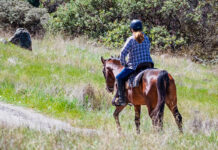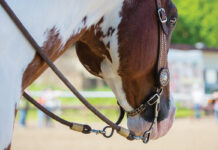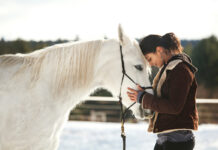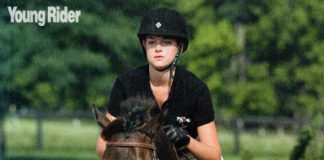 Reader’s Question: My mare recently kicked me when I was cleaning her corral. It’s not the first time she’s kicked someone. What can I do to teach her not to kick humans?
Reader’s Question: My mare recently kicked me when I was cleaning her corral. It’s not the first time she’s kicked someone. What can I do to teach her not to kick humans?
In both cases, it’s about the relationship you have with the horse. If a horse likes you and respects your leadership, he doesn’t feel like kicking you. The key is in building a relationship with your horse.
If the horse is not confident, you need to embark on a training program that builds confidence (as in our Level 1 / Partnership Program) and try not to make the horse feel trapped. If the horse is dominant, then you need to behave as horses do and build respect by moving the horse away and out of your space. Doing jumping jacks is one way to keep your horse out of your space. Don’t look at the horse; just start doing arm flapping jumping jacks, but make sure you don’t chase your horse. When she moves away you can stop. You also can drive the horse away (Driving Game; game number three in the Parelli 7 Games.) Another good idea is to put a halter and 12 foot line on the horse and have her follow you as you do chores outside.
Finally, think of the horse’s corral as her bedroom. People don’t tend to think from the horse’s point of view and instead they just walk in the corral and go about business without realizing that what they are doing might be offensive or threatening to the horse. Before walking into the corral, get your horse’s permission to enter. Do this by standing at the door until she comes over. Give her some treats and rub on her, then politely go in and spend time rubbing and scratching her until she feels relaxed. Only then start working around the corral, and remember to reconnect with her from time to time. Never enter the corral when the horse is not looking at you.
If your horse is dominant, the type that wants to chase you out of the corral, you’d be better off taking her out of the corral when you’re cleaning it until you’ve built more love and respect, and she thinks of you as the leader.






I thought the comment to be very direct and sensitive to the situation. I just wonder, as another point of view, if desensatising would maybe help..the “touch-and rub” . Pat has worked a bit with my then QH in a clinic in Alpine, Calif. I find that the majority of problems with People/horses is lack of time together and knowledge. Could you cover the “when horses are on a trail ride” and lay ears back and kick if a horse gets too close, so one must ride at the back of the line? Article was good..thank-you for doing it..wish more people were aware of this web site, especially young children who are just starting out with not enough guidence..and correct approach. Thanks to you and TV like RFD (which many do not have) and tapes/CD’s one can get at the library I find that folks are becoming better educated..Thank-you, thank-you, thank-you!
this is my first visit to HorseChannel.com I’m just poking around and this caught my eye.
Bravos all the way around. I always ask permission to enter my horses’ spaces. It just makes good sense.
i’ve never thought about the corral being my horses bedroom. thanks for the advice!
Pat & Linda ARE THE GREATEST!!!
Very good article, I am in level 2 of the parelli program and they sure have alot of, common sense ,training with horses. No one would ever think about asking their horse if they could enter their stall or not. Need to think like a horse.
I have a nineteen-month-old Welsh filly who kicks due to lack of respect(she was hand raised). I am working through it, but she still kicks on occasion. Sometimes it’s due to respect issues, sometimes it’s fear(crowding). The reccomendations in the article are the same as the methods I use, but I don’t have any of the Parelli kits because they’re too expensive.
Hi. I would like to say that everything you and Linda Parelli have said about training horses has definitely helped me train both my two horses along with three other of my friends horses. I’ve never been to any of you tours (though I would absolutely love to someday,) but watching your shows on TV has allowed me to have great results from the horses I have trained because of what I have learned from the two of you. For the first time, I really feel like I can follow someone else’s training methods with ease and great success. I have tried other methods in the past and some of them have worked, but your methods seem to work better by far. Besides I feel very strongly about natural horsemanship and that is what I like about you training. So, if I can speak on behalf of those who watch you and myself who train by your methods, keep doing what you are doing because you have helped not only the people who train horses, but most importantly, the horses who are learning from us as well.
I’m no expert, but I have trained horses and it sounds like your horses kicking has turned into a “fearful aggressive” thing. Whereas before your horse was probably exibiting a “fearful assertive” kind of kicking. Quite simply, she was not sure who the dominant one was so she was “testing” the waters at first to see who is dominant and when she saw that there was no dominant one then that’s when she decided to escalate because she has begun to think that “she” is in control, not you. Horses need to have a sense of dominance in a human to horse relationship. Don’t think that being “dominant” is a bad thing but more so a “natural” thing for a horse, because in the wild there is always an alpha male or alpha female (usually female) in a herd of horses, so therefore, if you aren’t the dominant one then that makes your horse think that she is the dominant one. So just think of it that way and you wil create a much safer and more established relationship with your horse. I hope this tip was helpful for you and your horse.”80% of training a horse is understanding their psychology.”
-Ana
Our horse bites. What can we do do to make him stop?
I really enjoy the Parellis’ approach to horses and training. They are training us as much as the horses we love. My husband is a Clinton Anderson fan. But these guys are more pets to me and I love the idea of playing with them to get the response and respect I desire from them. I’d love to read the response about horses thoughts on humans but it doesn’t link you to their answer. A general page appears.
That is good. My horse is dominant and we put him away when he does that because we are afraid of him.
What a GREAT article. I start every morning by spending time with my horse in her corral before I clean and she enjoys the pets and treats then I can clean with no problem.. Thanks Par & Linda for a Great Article…
usally you can’t train a horse not to kick. It’s what they do. When the horses are little they are soposed to be taught not to kick by there parents. When the horses play in the field they only kick because there playing. They don’t really hurt eachother even though it looks like it.
My mare has done that before. Whenever they start to show signs such as picking up hind leg with ears pinned, give a smack on the belly and make them back up for a while. And repeat, the message will go through. And also, don’t show that you are scared.
Fabulous!!
love them!
You always add details I never hear anywhere else. I’ve been taught to chase the horse away to show dominance if she’s not responding to my suggestion of getting her halter on, but I was not told to not look at her and to stop as soon as she moved off. Thanks for the fine tuning.
no expert, I have found that if you tie the horse up, act like you are going to walk be hind it (stand just to the outside of its kicking range), take a power pressuered hose and let the water hit his heels. He will soon get tiered of trying to kick something that simply is not there. He will most likely turn his hind quarters away from you. As soon as he does turn the hose off. you won that round for dominance. If he swings his hind quarters twards you back out of the kicking range and keep the water on his heels.
Thank you, very helpfull as I have a 2 year old mare that does the same thing. She just hasn’t commected with me yet. As you said I see it comming. Haven’t had her long so I’ve got a long road ahead, but we’ll get there.
great article
Hello
My horse is a 15yr arb i bought a mare to be his stable mate so that he would not be along my problem is when ever i am in the pasture or stall with him he attacks the mare when ever she comes near us he pins back his ears and goes for her i don’t understand if it’s something i am doing or if i can fix this. Please tell me what to do and why he is doing this
This soo worked with my horse snoopy!
Patty Crain, perhaps your horse is being defensive of you? Like, maybe when your mare comes to get treats/attention, your other horse tries to chase her away from his ‘territory’. If you feed them treats when you come, he could be preventing her from getting them, so that he can have more. It’s an idea. As for how to solve it, I don’t know, sorry 🙁
When I first got my philly, she tried the same thing, both out of fear and aggression. Once I was able to trust my instincts around her and I WANTED to be in control, she stood back. Now, I can pick her feet and rub her underside ANYWHERE. This truly does work!
With any closed space encounter with your Horse, it is always wise to talk to your horse, and keep a gentle hand on his/her rump while being behind her.This ensures the horse knows where you are (they cannot see directly behind them), and they get very used to your voice.With the few instances I’ve had with a rear hoof raising or tail swishing, I turn my attention directly to my horse, and with a stern voice (not a scream or yell) tell them NO! NO! while making quite sure I am out of the direct kick zone.
This seems to work for me, and they know I mean business. With this method, I never hit my animals,as they don’t understand a violent hand anyway…
I don’t agree with corporal (hitting) punishment, never amounts to any benefit or respect. I’ve seen too many people get the wrong message across that way.
Good luck/ Lots of patience
great advice thank you
Thank god I don’t have this problem but the advice is great.
Great advice and ive tryed the driving game but my now 2year old throughbred from last month likes to chase people and we think he still has his baby mine, and we have tryed the carrot stick thing like when he comes closer but then he wants to take on the stick or tries to back up really fast? He needs some really good training.
like advice. gotta 3 yr tb filly that will try to hurt you.
Great info!!!!!! I never thought of proving my space to my baby:)
Good advise!!
I never though of things from the horse view. Good advise.
Todally agree with Pat!
great article
What bunk. “Ask your horse’s permission to enter”? I agree that you should get the horse’s attention so you don’t startle it when entering, but if you have to wait at the gate for the horse to come over, then I know some people who would be waiting for years because their horses simply aren’t like that.
the parelli answer to the HORSE KICKING is incomplete and a lot of bs included, where do they get thier expert answers from all the worldchampions they trained they wont give me a list i have a list where is theirs, in thier safem its all about the money and the arrogrance horses also kick in play, so they forgot that one, they dont even know the situation of the kick but they answer any way, bull feathers
Lots of comments say this article is great, and it works, etc. But then another few people say it’s false/horrible, etc… I wonder who’s right?
Whenever I gallop my horse,she stops and bucks!I recently fell and hit my head and back really hard because of this annoying habit.What can I do to make it stop?
I learned about parelli when getting my horse, and did lots with her on it. She respects me now more compared to before, and he jumpingjacks thing works amazing!! Now she does not enter my space bubble without getting my permission. She knows how to undersgand me and i understand her a lot better. Parelli is awesome! 🙂
“If a horse likes you and respects your leadership, he doesn’t feel like kicking you.” What nonsense! Horses that like each other kick each other all the time, LIKE has nothing to do with a kick, one way or the other. It’s about respect, a horse can love you and still disrespect you. If that seems impossible, then have you ever had to deal with a teenager?
This kind of thinking is damaging because it will lead a bunch of well-meaning but ignorant equestrians to think that their horse hates them if they get kicked (not necessarily true) or that if they just make their horse LOVE them enough they’ll never ever get kicked (completely untrue).
Kayla, first make sure your horse doesn’t have a physical problem thats causing her pain and make sure her tack isn’t the problem. If there no problem causing her pain then focus on your riding. Make sure you not in her mouth, bouncing on her back, ect. When she tries to stop and buck, move her feet! Do circles, figure 8’s, back up,really make her work. She’ll learn that when she bucks she’ll just have to work even harder. Remember to never punish her. Be firm not mean. And when she doesn’t buck, reward her by rubbing her, letting her rest and praising her.
I hope this helps. 🙂